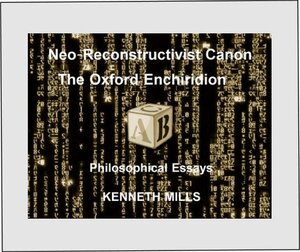Neo-Reconstructivist Canon: The Oxford Enchiridion
von Kenneth MillsReconstructivism is a philosophical call to return “back to the basics” after a phase of deconstruction, post-modernism, post-humanism, and other persisting schools of thought which have survived the last turn of the century.
The Oxford Enchiridion is a philosophical tour de force directed at the pinnacles of philosophical academia and their major proponents, basically consisting of the materials intended for an Oxford Research Fellowship. Its central message was heard clearly enough by the Oxford and Harvard scholars addressed here, as the text and its conscious technique of creative Entfremdung used as social critique predated significant occurrences on the world stage: In one essay in dialogue form, for example, Mills allows Plato's “Eleatic Stranger” to appear as a waterboarder and torturer who discusses the lax moral principles typical of four-dimensionalist theory as espoused in present-day British scholarship. Several years later, Great Britian would be charged with such crimes by the International Criminal Court in connection with the Iraq War.
As a central motif, Mills presents a simple but enlightening solution to Zeno’s Paradox of Motion and utilises this model to explain essential differences between Cartesian res cogitans and res extensa that are indispensable for applying results of modern physics to fundamental philosophical problems of an epistemological and ethical nature. The main objective is to better apprehend the central role that probability plays in the most fundamental philosophical matters and to remain at that argumentative level.
In this first of two volumes of essays, the author presents the results of his three German studies - Autarkie, Selbstbewusstein und Selbsterhaltung, Cheirônos Encheirídion: Kritisches zu den neueuropäischen Grundlagen der Soziologischen Aufklärung, Globale Souveränität und Zivilgesellschaft - in the more condensed form typical for Anglo-American academic philosophy.
Focusing on the complex subject of human consciousness while presenting a new theory, Mills takes a closer critical look along the way at the best that counterpart, four-dimensionalist, and counterfactual theorists have to offer on the subject, and finds these developments severely wanting.
In tone, Mills argues from the centre of a philosophical heritage which traces its lineage back to the historical Socrates as the mentor of a widely misinterpreted and underestimated tradition carried on by Antisthenes and the Cynics, the “most Socratic” of the Socratics.
The Oxford Enchiridion is a philosophical tour de force directed at the pinnacles of philosophical academia and their major proponents, basically consisting of the materials intended for an Oxford Research Fellowship. Its central message was heard clearly enough by the Oxford and Harvard scholars addressed here, as the text and its conscious technique of creative Entfremdung used as social critique predated significant occurrences on the world stage: In one essay in dialogue form, for example, Mills allows Plato's “Eleatic Stranger” to appear as a waterboarder and torturer who discusses the lax moral principles typical of four-dimensionalist theory as espoused in present-day British scholarship. Several years later, Great Britian would be charged with such crimes by the International Criminal Court in connection with the Iraq War.
As a central motif, Mills presents a simple but enlightening solution to Zeno’s Paradox of Motion and utilises this model to explain essential differences between Cartesian res cogitans and res extensa that are indispensable for applying results of modern physics to fundamental philosophical problems of an epistemological and ethical nature. The main objective is to better apprehend the central role that probability plays in the most fundamental philosophical matters and to remain at that argumentative level.
In this first of two volumes of essays, the author presents the results of his three German studies - Autarkie, Selbstbewusstein und Selbsterhaltung, Cheirônos Encheirídion: Kritisches zu den neueuropäischen Grundlagen der Soziologischen Aufklärung, Globale Souveränität und Zivilgesellschaft - in the more condensed form typical for Anglo-American academic philosophy.
Focusing on the complex subject of human consciousness while presenting a new theory, Mills takes a closer critical look along the way at the best that counterpart, four-dimensionalist, and counterfactual theorists have to offer on the subject, and finds these developments severely wanting.
In tone, Mills argues from the centre of a philosophical heritage which traces its lineage back to the historical Socrates as the mentor of a widely misinterpreted and underestimated tradition carried on by Antisthenes and the Cynics, the “most Socratic” of the Socratics.






